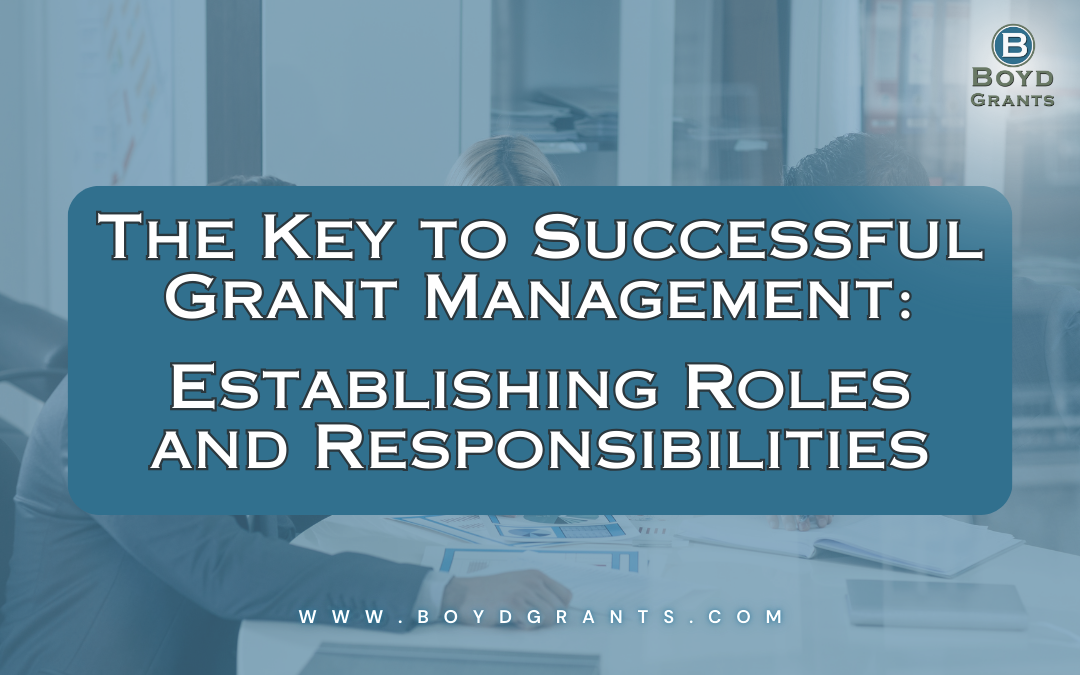Objective:
Successful grant management doesn’t just depend on the right tools; it also requires clear roles and responsibilities from the very beginning. In this blog post, we’ll explore how defining roles early, setting up clear reporting and invoicing timelines, and assigning accountability for tracking and compliance can lead to more effective grant execution. This is a crucial step in ensuring that grant funds are used efficiently, deadlines are met, and compliance is maintained. We’ll introduce how our Grant Management Kickstart Package can help organizations set these foundations for success.
Key Points:
1. The Importance of Defining Roles Early in the Grant Lifecycle
The Challenge:
In many organizations, confusion about who is responsible for different parts of the grant management process can lead to missed deadlines, incomplete reports, and even lost funding. Without clear delineation of roles, critical tasks like budget oversight, performance tracking, and compliance management can easily fall through the cracks.
The Solution:
From the start of the grant lifecycle, it’s essential to assign specific individuals or teams to oversee various aspects of the grant. For example:
- Grant Manager: Responsible for the overall execution of the grant, ensuring that the project stays on track and funds are used appropriately.
- Finance Team: Oversees budgeting, financial reporting, and ensuring expenses align with the approved grant budget.
- Program Director: Focuses on program implementation, ensuring that objectives are met, and progress is documented.
- Compliance Officer: Ensures that the organization adheres to all legal and contractual obligations related to the grant.
By clarifying these roles early on, your team can avoid overlaps and gaps in responsibilities, ensuring a smoother process from start to finish.
2. How Clear Timelines for Reporting and Invoicing Make a Difference
The Challenge:
One of the most common pitfalls in grant management is missing key reporting or invoicing deadlines. Delays in submitting performance reports or invoicing for expenses can result in payment delays, non-compliance, or even penalties.
The Solution:
Establishing a timeline for all grant-related tasks is critical. This includes:
- Reporting Deadlines: Work backwards from the funder’s reporting deadline to establish internal deadlines for data collection, report drafting, and final review.
- Invoicing Schedules: Set clear dates for when expenses should be submitted for reimbursement and when financial reports are due.
- Progress Check-ins: Schedule regular internal check-ins to ensure that the grant is on track and that everyone is meeting their responsibilities.
A detailed grant management timeline helps ensure that your organization never misses a deadline, keeps payments flowing, and avoids compliance issues. It’s all about being proactive and organized.
3. Best Practices for Assigning Responsibility for Tracking, Reporting, and Compliance
The Challenge:
When multiple departments or individuals are involved in grant management, it can be easy to lose track of who is responsible for each piece of the puzzle. This can lead to confusion over who is tracking expenses, submitting reports, or handling compliance checks.
The Solution:
Here are a few best practices for assigning responsibilities:
- Centralize Documentation: Use a shared system or platform where all grant-related documents, including expense reports, time and effort forms, and performance metrics, are easily accessible to the whole team.
- Assign Task Owners: Each task, from expense tracking to performance reporting, should have a designated owner who is accountable for its completion.
- Establish a Communication Chain: Define how and when teams should communicate about grant progress. This could include monthly check-ins or status updates, especially before major deadlines.
- Regular Compliance Audits: Assign a compliance officer or team member to periodically review all documentation to ensure the organization remains audit-ready.
This approach ensures that all team members are on the same page, tasks are completed on time, and the organization remains in full compliance with grant requirements.
Conclusion:
Effective grant management starts with clear communication and accountability. By defining roles and responsibilities early, setting up timelines, and ensuring everyone knows their part, you can eliminate confusion and improve the efficiency of your grant management process. Whether your organization is managing a single grant or multiple funding streams, clear roles and responsibilities are the key to success.
“Our Grant Management Kickstart Package includes everything you need to establish roles, timelines, and best practices for success. If you’re ready to simplify your grant management processes and ensure compliance from day one, stay tuned for the launch of our new services!”

Recent Comments